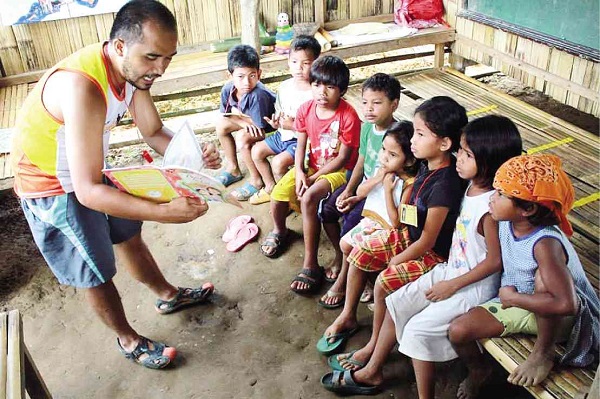
REY BUFI reads a story to Dumagat children in Purok Tayabasan in Antipolo City.
THE STORYTELLING PROJECT/Contributor
Although he himself was not fond of books, 30-year-old Rey Bufi came to realize that things could be a whole lot better if every child knew how to read.
Bufi had this in mind when he and his 27-year-old girlfriend, Grace Soriano, left the corporate world and started a literacy advocacy program, called The Storytelling Project (TSP), in 2011. They have since gone to the most unheard-of rural communities, bringing books and teaching aids with them and telling stories to children.
Bufi was working in the human resources department of Smart Communications Inc. when he met Soriano in the company’s information technology department. Both became active in Smart’s foundation, which has been sending employees out on weekends to read books to schoolchildren.
While going around Metro Manila, they observed how public libraries sorely needed books and how actual interest in reading was nowhere to be found there.
“You could just imagine the books turning dusty because no one wanted to read them,” Bufi recalled.
Developing a habit
He realized that making reading a habit would take some time—something he did not have until he was in college. “I remember we had to read like 10-page philosophical articles and I had to go over them again and again before I understood them,” he said.
To survive in class, he took his professor’s advice to read what most interested him. He started with John Grisham novels, he recalled, until reading became a rapturous thing.
“I also noticed how my reading comprehension really improved,” he said.
It takes 21 days to start or break a habit as experts say, but to Bufi, it meant doing something continuously over time. In the TSP case, storytelling has become more than a half-day activity but weeks, even a month, of living in the host communities.
Commitment
The program has gone to faraway communities, such as Pactil in Bauko, Mt. Province; Sison, Pangasinan; Rodriguez, Rizal; and, recently, to a Dumagat community in Tayabasan in Antipolo City, where children do not have access to books or school at all.
Bufi and his partner dressed up like the characters in the storybooks when they read “Si Emang Engkantada at ang Tatlong Haragan,” a tale of three children who refused to care of the environment. Using a sponge and a basin of water, they demonstrated how trees prevented floods.
To keep the TSP going, their former colleagues at Smart helped them promote the advocacy, like staging fun runs to raise funds.
Immersion
Bufi is currently juggling two jobs—selling insurance policies and teaching on weekends—to finance their trips that often require hours of trekking and river-crossing under the sun’s heat or heavy rain.
Once in the communities, the couple would sleep in schools, village halls or chapels, and eat whatever is available to them.
“Our families would tell us to find ourselves steady jobs,” Bufi said.
Grace’s mom would often worry about her security, especially in places without a cellphone signal. “We always tell our families that it’s part of our commitment,” Bufi said.
Whenever they come at crossroads, Bufi is spurred to move on, inspired by his own story of an instance when he was about to cross a rampaging river and felt scared for his life.
“I thought once, twice of turning back home but eventually decided to go on. When I reached the school, the students were all there, soaking wet, but all waiting for me. Not a single one was absent,” he said.